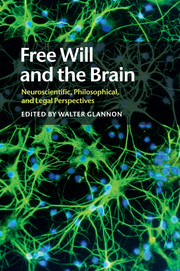
-
Select format
-
- Publisher:
- Cambridge University Press
- Publication date:
- October 2015
- September 2015
- ISBN:
- 9781139565820
- 9781107036031
- 9781108449304
- Dimensions:
- (228 x 152 mm)
- Weight & Pages:
- 0.6kg, 308 Pages
- Dimensions:
- (229 x 152 mm)
- Weight & Pages:
- 0.48kg, 307 Pages
You may already have access via personal or institutional login
Book description
Neuroscientific evidence has educated us in the ways in which the brain mediates our thought and behavior and, therefore, forced us to critically examine how we conceive of free will. This volume, featuring contributions from an international and interdisciplinary group of distinguished researchers and scholars, explores how our increasing knowledge of the brain can elucidate the concept of the will and whether or to what extent it is free. It also examines how brain science can inform our normative judgments of moral and criminal responsibility for our actions. Some chapters point out the different respects in which mental disorders can compromise the will and others show how different forms of neuromodulation can reveal the neural underpinning of the mental capacities associated with the will and can restore or enhance them when they are impaired.
Reviews
'If ever a subject needed multi-author perspectives, it is this one. Free Will and the Brain fulfils a crucial need by bringing together the expertise of philosophers, psychiatrists, neuroscientists and legal experts. It deals with most aspects of this vast subject, but is particularly strong on brain disorders that disrupt free will and their implications for legal decisions. I strongly recommend it!’
Peter Clarke - neuroscientist and former Associate Professor, University of Lausanne
‘Recent developments in neuroscience, drawing on findings from brain-imaging experiments and the like, have prompted exaggerated and philosophically naïve claims about the ‘illusory’ character of free will, and have been met with equally ill-conceived criticisms from some scientifically uninformed philosophers. This volume promises to be a valuable corrective to such fruitless debates and a genuine meeting of minds.’
Jonathan Lowe - former Professor of Philosophy and Director of Postgraduate Studies, Durham University
‘The rapidly accumulating insights into the functions and mechanisms of the brain have rekindled clinical, legal and philosophical interest in the concept of ‘free will’. Philosopher Walter Glannon has assembled an expert international team of scientists, clinicians, philosophers and other scholars who dig deeply into the questions of if, and how, neuroscience changes our understanding of free will. Glannon’s insightful introduction provides an overview of breadth and substantive depth. His contributors provide the latest and best thinking about this very complex problem.’
John Z. Sadler - Daniel W. Foster, M.D. Professor of Medical Ethics, Southwestern Medical Center, University of Texas
Contents
Metrics
Altmetric attention score
Full text views
Full text views help Loading metrics...
Loading metrics...
* Views captured on Cambridge Core between #date#. This data will be updated every 24 hours.
Usage data cannot currently be displayed.
Accessibility standard: Unknown
Why this information is here
This section outlines the accessibility features of this content - including support for screen readers, full keyboard navigation and high-contrast display options. This may not be relevant for you.
Accessibility Information
Accessibility compliance for the PDF of this book is currently unknown and may be updated in the future.


